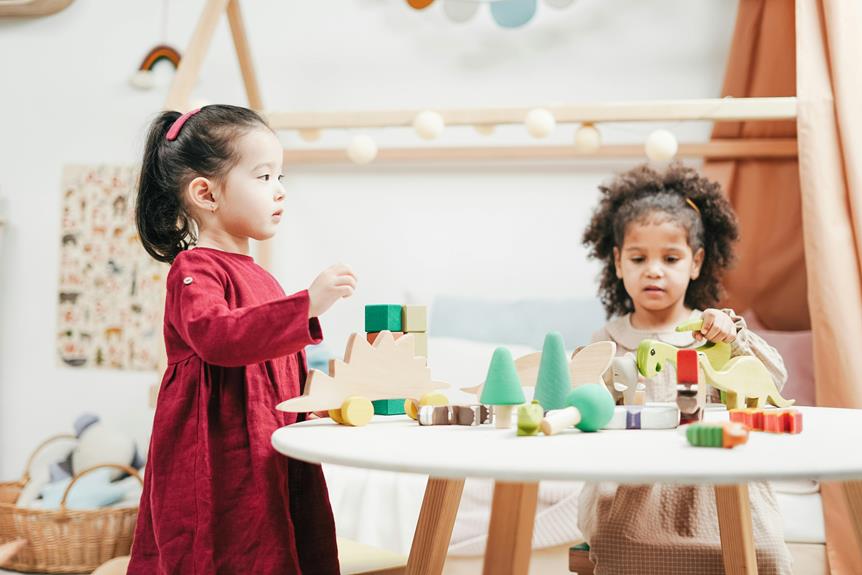
Blog
How Can I Introduce Musical Toys to My Baby for Early Learning?

You can introduce musical toys to your baby by choosing age-appropriate options that stimulate their senses and aid in cognitive development. Start with soft melodies and vibrant colors to engage your infant's auditory senses. As your baby grows, select toys that promote movement and interaction, enhancing their motor skills and hand-eye coordination. By incorporating musical toys into your daily routine, you can create a soothing environment during feeding and bedtime, ultimately fostering early learning through music. As you explore the benefits of musical toys further, you can discover more ways to enhance your baby's development and bond through sensory experiences.
Benefits of Musical Toys for Babies
When introducing musical toys to babies, you're providing them with a stimulating and educational experience that can enhance their cognitive development. The benefits of musical toys for babies are vast. These toys not only entertain your little one but also help in the development of crucial skills.
As babies interact with musical toys, they engage their auditory senses, sparking curiosity and encouraging active listening. This early exposure to different sounds and rhythms can aid in language development and pattern recognition.
Moreover, musical toys can also promote motor skills as babies grasp, shake, or press buttons to produce sounds. This physical interaction enhances hand-eye coordination and fine motor skills. Additionally, music has been linked to emotional development, with certain melodies or rhythms having a calming effect on babies, helping them regulate emotions and reduce stress.
Choosing the Right Musical Toys
To select the most suitable musical toys for your baby, consider their age, interests, and developmental stage. For infants, choose toys with soft melodies, gentle sounds, and vibrant colors to engage their senses. Look for toys that are easy to grasp and manipulate, helping to improve their fine motor skills. As your baby grows, opt for toys that encourage movement and interaction, such as musical instruments like shakers or drums. Interactive toys that respond to touch or movement can also enhance your baby's cognitive development.
When selecting musical toys, keep safety in mind by choosing toys that are age-appropriate and free from small parts that could pose a choking hazard. Consider toys made from non-toxic materials and easy to clean to ensure your baby's well-being. Additionally, choose toys that align with your baby's interests, whether they're drawn to animals, shapes, or different sounds. By selecting musical toys that cater to your baby's age, interests, and development, you can provide them with engaging and enriching play experiences.
Incorporating Musical Toys Into Daily Routine
Consider integrating musical toys into your baby's daily routine to enhance their sensory experiences and foster early development.
Start by incorporating musical toys into playtime to stimulate your baby's auditory senses. Encourage your baby to explore different sounds and rhythms by providing them with a variety of musical toys such as rattles, musical plush toys, or toy instruments.
During feeding time, play soothing music in the background to create a calming atmosphere and make mealtime more enjoyable for your little one.
Additionally, incorporate musical toys into your baby's bedtime routine to help them relax and prepare for sleep. Playing gentle lullabies or using a musical mobile can create a soothing environment that promotes better sleep quality.
Enhancing Early Learning Through Music
Integrating music into your baby's daily routine can significantly enhance their early learning experiences. Music has a profound impact on cognitive development, language skills, and emotional well-being. Exposing your baby to various musical genres, rhythms, and melodies can stimulate their brain and improve memory retention.
Singing lullabies or playing soothing music during nap times can create a calming environment and help regulate your baby's sleep patterns.
Music also plays a crucial role in promoting social skills and bonding between you and your baby. Dancing together to music or clapping along to songs can strengthen your emotional connection and create joyful moments of shared experience.
Additionally, music can enhance your baby's motor skills development through activities like playing with musical instruments or engaging in musical games that involve movement.
Tips for Introducing Musical Toys to Babies
Introducing musical toys to your baby can be an engaging way to further enhance their early learning experiences through interactive play. Here are some tips to help you introduce these toys effectively:
- Start with simple musical toys that are age-appropriate for your baby. Look for toys that are easy to grasp and manipulate.
- Use the musical toys during playtime to create a fun and stimulating environment. Sing along to the music, dance together, or encourage your baby to explore the sounds the toy makes.
- Rotate the musical toys regularly to maintain your baby's interest and prevent boredom. This also helps in exposing your baby to different types of sounds and music.
- Incorporate the musical toys into your daily routine, such as during diaper changes or before naptime, to make it a familiar and enjoyable experience for your baby.
- Observe your baby's reactions and preferences to understand what types of musical toys they enjoy the most. This can help you tailor their playtime experiences to suit their interests.
